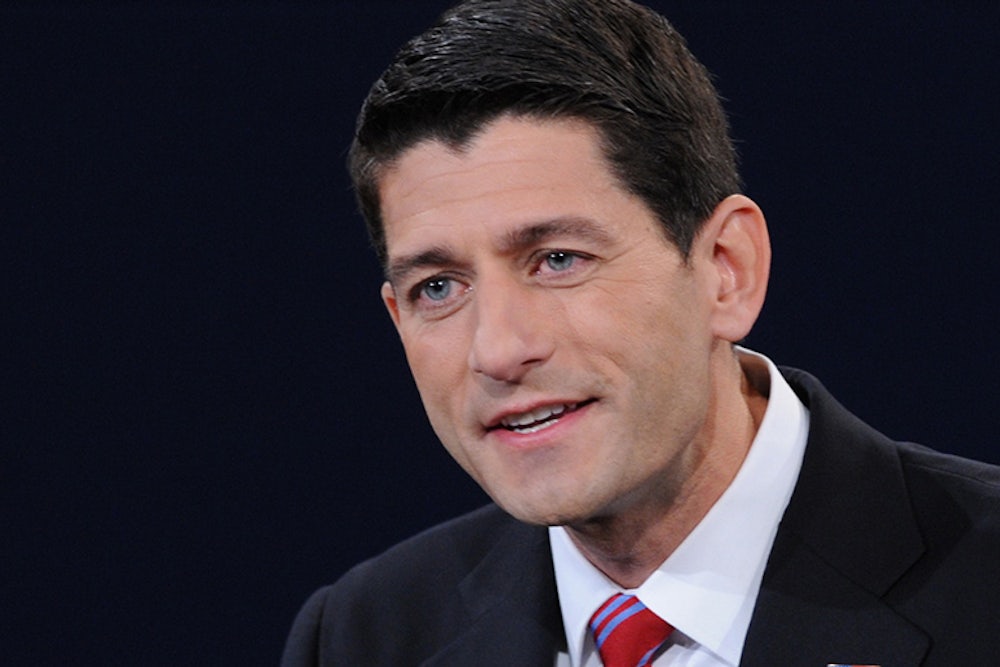The House Budget Committee released a report about anti-poverty programs on Monday. It's as comprehensive a guide to Republican policy thinking as you'll find these days—and, in many respects, it's everything you would expect from Budget Chairman Paul Ryan and his allies.
The report focuses on what these programs do wrong, while giving scant attention to what they do right. It hypes data that support conservative conclusions, while relegating contravening data to asides and footnotes. The report’s central claim, for example, is that programs have not done much to reduce poverty. As many of us noted a few weeks ago, when Lyndon Johnson’s War on Poverty turned 50, the record suggests that poverty is a lot lower than it would have been if these programs never existed—particularly if you count the impact of programs like food stamps and the Earned Income Tax Credit, as most experts would agree is appropriate.

Still, the report is not a screed. The tone is dry and academic. While it doesn’t highlight studies supporting liberal conclusions, it doesn’t ignore them either. And the takeaway isn’t that all anti-poverty programs are a total waste. It’s that most of the programs lack decent coordination and management, while some have serious design flaws. Surely there's some truth there.
But the real question is what to do about these problems—how to reform these programs, so that they work better. And if you read the report carefully, you'll find pretty good evidence that Ryan's approach is the wrong one.
The section on Head Start is one place to look. Ryan’s report notes that the architects of Head Start hoped that it would help low-income children succeed in school—and that, according to some evaluations of the program, the gains the kids make disappear over time. That's true, though the evidence is mixed. But the Ryan report also notes that research has shown that kids in some programs do better—not just in the short-term but the long-term, as well.
What’s the difference? The report doesn’t say, but researchers can tell you: The programs that work are the ones that have more qualified, experienced teachers and have a clear, educational focus. Money tends to help with that. "The best preschool results require consistently positive educational interactions between skilled, experienced teachers and students," says Timothy Bartik, senior economist at the Upjohn Institute for Employment Research. "Although higher spending per student does not guarantees better teacher-student interactions in the preschool classroom, it is certainly easier to achieve these results if teachers are well-trained and paid good wages, and if the program has a clear educational focus."
The other interesting section in Ryan's report is about health care—and, specifically, Medicaid. Some people on the program really do have a hard time to seeing physicians, although the problem isn’t as severe as commonly assumed. Because they are waiting longer to see providers—and, sometimes, stuck with low quality professionals or institutions—they can end up in worse health. But the Ryan report itself points out a huge reason for this: Medicaid pays far, far less than private insurance does. If Medicaid paid more, physicians and clinics would be willing (and able) to see more patients—and access would improve.
None of this is to say more money would fix every problem in every program. Pouring more dollars into some anti-poverty programs really would be a waste. If Republicans have real ideas for reforming the programs—whether it's to streamline management, reduce waste, or better align incentives work—then the rest of the country should listen. The ideas might have some merit.
But one way or another, truly fixing anti-poverty programs is bound to require spending a lot of money—and, quite possibly, it's going to require spending more than the government spends today. Ryan’s budgets, of course, have always sought to do the very opposite. In last year's proposal, according to analysis by the Center on Budget and Policy Priorities, about two-thirds of its cuts would have come from programs that serve people with low or moderate incomes.
"The report identifies several defects in important programs," says Harold Pollack, a New Republic contributor and expert on social services at the University of Chicago. "For example, Medicaid would be a more effective program if its reimbursement rates were closer to that of Medicare and private payers. While lamenting these problems, Rep. Ryan and others have consistently proposed policies such as cutting or 'block granting' federal Medicaid expenditures. Such approaches would aggravate these same program shortcomings."
Ryan's report is a prelude to the budget he will release, sometime soon. That document, not Monday's report, will be the one that reveals his true priorities—and those of his party.
